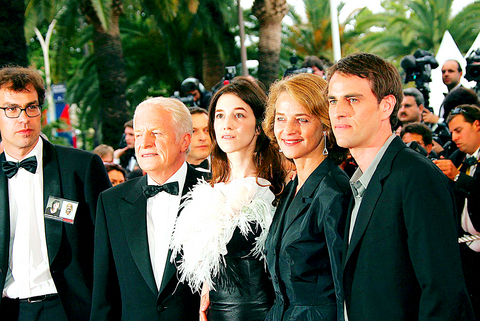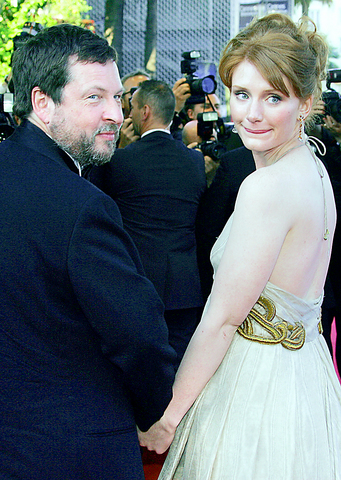The tough reality of European cinema is that about 70 percent of ticket sales here are for American movies. And despite a few recent cross-border successes such as The Chorus or A Very Long Engagement, the figures are not budging.
As Europe debates its new constitution and future as never before, politicians at the Cannes Film Festival are focusing on one small-scale idea: how Internet movie distribution might overcome some pitfalls of the box office.
The EU's commissioner for media, Viviane Reding, was to meet Tuesday with film and telecommunication executives to talk about possible policies for film distribution online, and how similar technologies could promote cultural diversity.

PHOTO: EPA
If more movie-lovers can pick films from a wide selection online, the theory goes, they might not opt for multiplex hits.
"We produce 750 to 800 films a year in Europe," Reding said. "The problem is that many of these movies never reach the screens. Citizens don't have access to a lot of these movies, and because of that, new technologies can help."
Beyond that are broader issues. One question now is what exactly is a European movie?

PHOTO: AFP
A Paris court ruled in November that A Very Long Engagement was too American to compete in French film festivals because of its Warner Bros backing. The ruling has been appealed.
There are also questions about another Warner Bros picture, Harry Potter and the Prisoner of Azkaban. It was shot by Mexican director Alfonso Cuaron but based on a British book, filmed in Britain and had a mostly British cast.
``The UK film council considers that Harry Potter is British,'' said Andre Lange, head of markets and financing at the European Audiovisual Observatory. ``In our statistics, we count it as American.''
The observatory says 71.4 percent of last year's movie admissions in the 25 European Union countries were for American films, while homegrown films accounted for 26.5 percent. The figure was about the same the year before.
For European talent, the dilemma is often whether to work at home or in Hollywood, which brings more money and fame. Spanish stars Antonio Banderas and Penelope Cruz have
careers on both sides of the Atlantic. Two German directors -- Wolfgang Petersen (Troy) and Roland Emmerich (The Day After Tomorrow) -- were behind two of Hollywood's biggest recent productions.
Then there are European filmmakers who shoot movies in English with Hollywood stars.
In Cannes, Wim Wenders of Germany is showing Don't Come Knocking, about a washed-out former star of movie Westerns and featuring Sam Shepard, Sarah Polley and Tim Roth. Lars von Trier of Denmark cast Bryce Dallas Howard (The Village) in his film set in 1930s America, Manderlay.
Dominik Moll, the French filmmaker whose Lemming played opening night, says his next project may take him to the United States. He hopes to adapt two stories by US author TC Boyle.
``The idea would be to shoot them in America with American actors but with French production, to keep the control,'' Moll said. He said he was not ready to try the American studio system.
One fear in Europe is that because American studios are courting European talent, the continent might one day be left with only art-house films.
Preserving Europe's diversity is one of the central questions in EU cultural debates. France is especially attached to its right to subsidize movies, protecting the industry from Hollywood.
French President Jacques Chirac invited hundreds of artists and intellectuals from around Europe to the Elysee Palace this month to promote the European constitution as a barrier against "homogenization."
France is in a heated debate ahead of a May 29 referendum on whether to ratify the constitution, which includes measures that will continue to protect state aid for the audiovisual sector.
In France, the industry had a particularly successful year.
The Chorus, the French tale of singing schoolboys, was nominated for Best Foreign Language Film at the Academy Awards and was the biggest box-office hit at home.
The movie drew fans in part for its very specific postwar small-town-France setting.
Lange said that with more hit movies like those, a stronger European film industry might build confidence in the entire European project: "Films contribute to your understanding about your neighbors, their social and historical issues."

June 23 to June 29 After capturing the walled city of Hsinchu on June 22, 1895, the Japanese hoped to quickly push south and seize control of Taiwan’s entire west coast — but their advance was stalled for more than a month. Not only did local Hakka fighters continue to cause them headaches, resistance forces even attempted to retake the city three times. “We had planned to occupy Anping (Tainan) and Takao (Kaohsiung) as soon as possible, but ever since we took Hsinchu, nearby bandits proclaiming to be ‘righteous people’ (義民) have been destroying train tracks and electrical cables, and gathering in villages

Swooping low over the banks of a Nile River tributary, an aid flight run by retired American military officers released a stream of food-stuffed sacks over a town emptied by fighting in South Sudan, a country wracked by conflict. Last week’s air drop was the latest in a controversial development — private contracting firms led by former US intelligence officers and military veterans delivering aid to some of the world’s deadliest conflict zones, in operations organized with governments that are combatants in the conflicts. The moves are roiling the global aid community, which warns of a more militarized, politicized and profit-seeking trend

The wide-screen spectacle of Formula One gets a gleaming, rip-roaring workout in Joseph Kosinski’s F1, a fine-tuned machine of a movie that, in its most riveting racing scenes, approaches a kind of high-speed splendor. Kosinski, who last endeavored to put moviegoers in the seat of a fighter jet in Top Gun: Maverick, has moved to the open cockpits of Formula One with much the same affection, if not outright need, for speed. A lot of the same team is back. Jerry Bruckheimer produces. Ehren Kruger, a co-writer on Maverick, takes sole credit here. Hans Zimmer, a co-composer previously, supplies the thumping

Dr. Y. Tony Yang, Associate Dean of Health Policy and Population Science at George Washington University, argued last week in a piece for the Taipei Times about former president Ma Ying-jeou (馬英九) leading a student delegation to the People’s Republic of China (PRC) that, “The real question is not whether Ma’s visit helps or hurts Taiwan — it is why Taiwan lacks a sophisticated, multi-track approach to one of the most complex geopolitical relationships in the world” (“Ma’s Visit, DPP’s Blind Spot,” June 18, page 8). Yang contends that the Democratic Progressive Party (DPP) has a blind spot: “By treating any